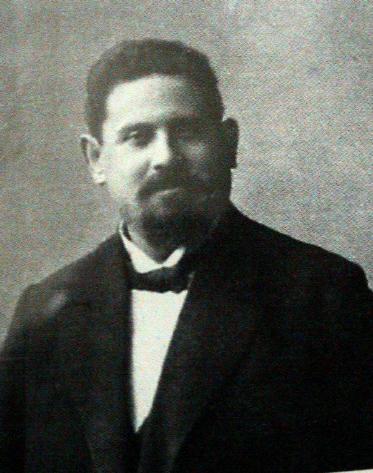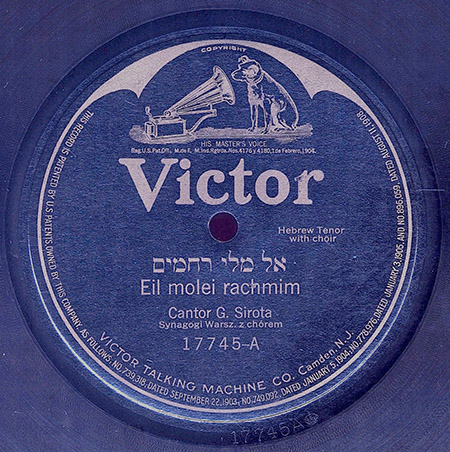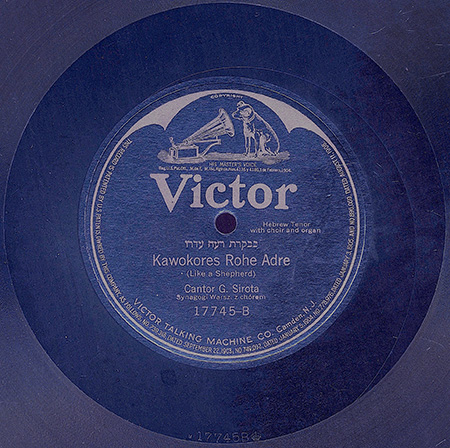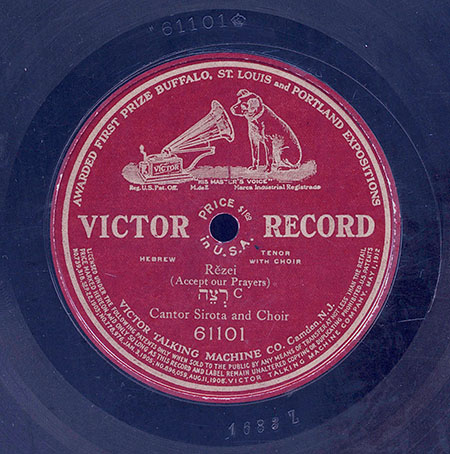He was born in 1873 or 1874, that's not sure, in Hajsyn in the Ukraine (Podolia region).
His father was a well
known cantor in a rural synagogue. He received his first vocal lessons from his father. In 1891, Gershon Sirota moved to Odessa
and started to sing at the Odessa synagogue.
His strong voice attracted the attention of the director of the Odessa conservatory,
Baron Kolbuss, and he received vocal training at the conservatory. In 1892, Gershon Sirota
made his debut at the Odessa opera. He sang in Die Schöpfung by Haydn together with the well known bass Lev Sibirjakov.
Gershon Sirota
took vocal lessons at the Vienna conservatory. In Vienna, Sirota became a protégé of Baron Anselm Rothschild, and was
torn between an operatic and a cantorial career. The
result was not his own decision: his father died, and he had to return to Odessa before his Vienna studies were finished; back
in his orthodox Jewish social environment, an operatic career was now out of reach, though he left Odessa soon again to take
the post at the Vilnius synagogue from 1896 to 1908.
From 1905, Gershon Sirota simultaneously sang in Warsaw.
In 1908, he
sang in St. Petersburg, where his singing was highly appreciated by
Tsar Nikolaj II. In St. Petersburg, he didn't only sing for the tsar, but above all for the tsar's mother,
Maria Fjodorovna – more precisely, he was asked to sing a benefit concert for a charity foundation of hers, and she
presented him with a golden watch with a personal inscription, which was an almost incredible honour for a Jewish cantor, given the
virulent Russian antisemitism. It created such a sensation that the Jewish communities in the Russian Empire had serious
hopes that, following Sirota's appreciation, their general position might improve somehow (vain hopes, of course).
In 1912, Gershon Sirota made his New York debut at Carnegie Hall. He was compared to Tamagno and Caruso, and was nicknamed
the Jewish Caruso. During World
War I, Gershon Sirota was ober-cantor in Warsaw. His
Warsaw congregation (at the Tłomackie Street synagogue) was not as enthusiastic about his (three) pre-war US concert tours as
his American audience, who were absolutely frenetic, including Enrico Caruso, who is said to have been a great admirer
of Sirota's art. His Warsaw choirmaster, Leo Lwow, served as his manager and arranged those tours for him.
Sirota was also
the first cantor who became a star of the recording industry, his records having spread his fame in the USA already before
he arrived there in person.
After WWI, he resumed his concerts in the US, and went on extended tours to Montreal and Buenos
Aires. In 1921, Gershon Sirota made his debut at the Metropolitan Opera in a concert. The conflict with the Tłomackie Synagogue
officials about his absences went on, which led eventually to his dismissal in 1924; but the affection of the Warsaw
congregation forced the synagogue directors to hire Sirota back in 1926. However, he wasn't greeted
with the usual enthusiasm – in America, he had changed his style towards "more operatic", and after a further leave for New
York in 1927, he was definitely dismissed from the Tłomackie Synagogue as soon as he came back home (Moshe Koussevitzky being his
successor).
For the rest of his career, he continued travelling both North and South America and Palestine, though from
1930 till 1935, he had at the same time a new permanent engagement in Warsaw, not at the Tłomackie but at a lesser synagogue
(the Nożyk). (Though it is not true that he had an engagement in Tel Aviv. His performance at the Allenby Avenue Great
Synagogue there in 1928 was just as a guest, to inaugurate the new synagogue.) His last US appearance took place in Milwaukee
in 1938.
He then returned to Warsaw partly because his vocal power started dwindling, but primarily because his wife fell
seriously ill, and that's also the reason why he didn't immediately leave when the Nazis overran Poland.
When he finally tried to, it was too late, and though he tried to get out of the country with the help of his American
friends and agents, all attempts failed. He and his whole family were killed by the Nazis during the uprising of the
Warsaw Ghetto in April 1943.



